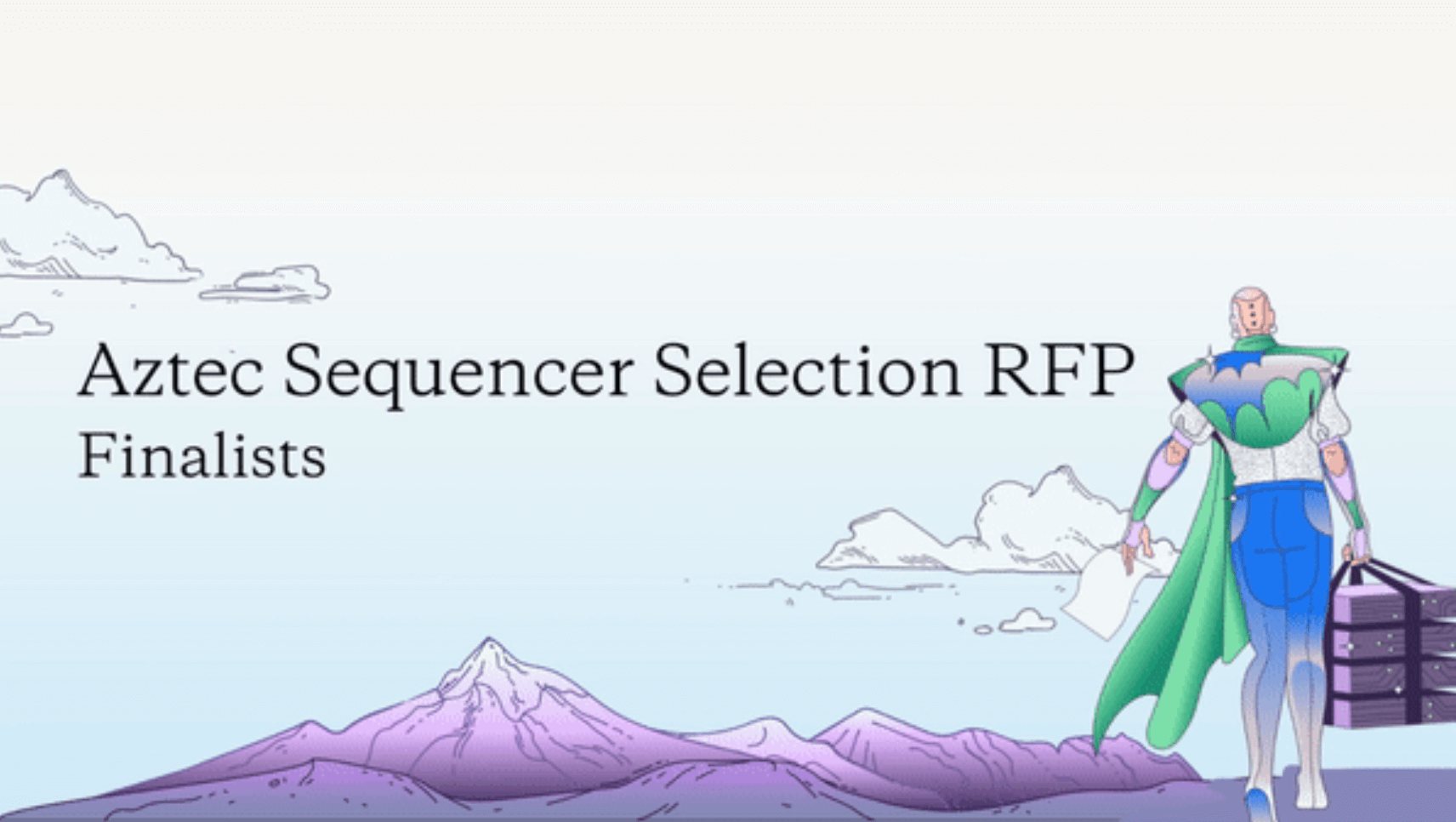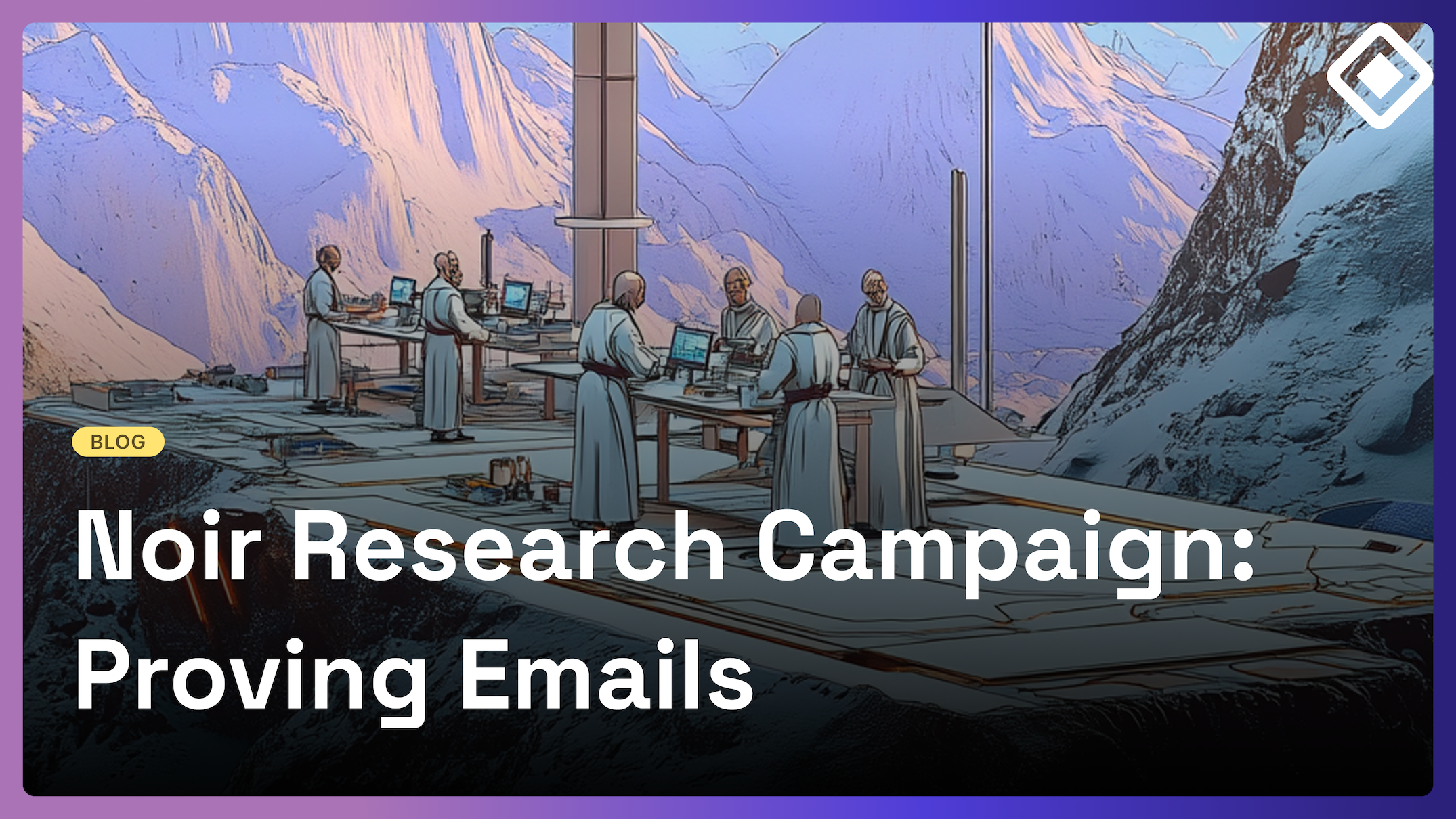Aztec is excited to announce the finalists from its Sequencer Selection Request for Proposals.
We are also excited to announce a formal partnership with BlockScience, an industry leading research and complex systems engineering firm with significant experience in the economic analysis of web3 systems, to help provide further independent analysis of the finalists.
Submitted proposals
To recap, we published an initial request for proposals on May 9th, 2023.
Throughout a multiweek process, we ended up with 9 unique proposals for how to build a decentralized sequencer selection protocol targeting Layer-2 zero knowledge rollups.
Authored by Espresso Systems
Community contributions
Authored by Aztec Labs
{{blog_divider}}
Decision making
The Aztec Labs team, with input from a variety of leading industry experts, carefully considered each of these proposals and compared them against the Aztec Network’s specific design priorities, such as: decentralization, liveness, censorship resistance, and privacy.
After a few weeks of deliberations, we are excited to share the final protocol candidates.
{{blog_divider}}
The Finalists
B52
Author: Joe Andrews @ Aztec Labs
B52 is a protocol that enshrines Maximal Extractable Value (MEV), taking inspiration from both MEV Auctions and PBS. It’s goal is to enshrine MEV into the protocol in order to maximise the value capture of the network and to tackle the centralising forces that arise from PBS head on. Enshrining an MEV auction forces builders to take part in a first price auction onchain for profitable blocks.
In each iteration, a proposer can submit a commitment to transactions within a block, as well as the percentage of block rewards (fees) that will be distributed amongst the proving network, and a amount of native network tokens to be burned.
Staked provers will then vote on which blocks they would like to work on, where rational provers will vote in the direction of maximizing their profits. These votes will be then used to calculate the block’s score, and the block with the highest rated score that gets published via a rollup and validated on L1 will become the canonical head of the chain.
Here is an updated version of B52
Fernet
Author: Santiago Palladino @ Aztec Labs
Fair Election Randomized Natively on Ethereum Trustlessly (Fernet) is a protocol for random sequencer selection. In each iteration, it relies on a VRF to assign a random secret score to each sequencer in order to rank them; each sequencer can then decide to propose a block or not based on their expected rank. Each sequencer proposes just an ordering for transactions.
After the initial phase where sequencers can reveal their scores and block proposals, provers choose which proposal they want to construct a proof for. In the event of multiple submissions, the one from the sequencer with the highest score (i.e. VRF) wins, so provers are expected to flock to the submission with the highest rank, avoiding redundant work.
Block proposals provide early confirmations in the happy path, whereas finality is only achieved at the end of a proving phase.
Contributions/acknowledgments: Mike Conner @ Aztec Labs, Espresso Systems
Here is an updated version of Fernet
{{blog_divider}}
Retroactive Grants
We are excited to award Espresso Systems two retroactive grants for their proposals Irish Coffee and Espresso Martini. These were both incredibly thorough, and shaped key decisions within Santiago’s Fernet protocol.
It is also worth acknowledging that Espresso Martini is extendable to most, if not all, other proposals, and could be considered in the future as an optional dependency in the Aztec block building lifecycle, providing users fast and efficienct pre-confirmations. However this was not included today as we do not wish to co-mingle timelines and block any potential engineering efforts.
We are also awarding smaller retroactive grants to the authors of the proposals suggesting we should use EigenLayer and a Based Rollup.
{{blog_divider}}
Next steps
Now that we have identified the two final candidates for a sequencer selection protocol, we are beginning the next phase of further analysis with BlockScience to provide an independent 3rd party perspective. This will result in a public report from the BlockScience team. Currently we expect this report to be published in Q3.
Example questions that BlockScience might be considering include:
- What happens if the block builder is the same on L1 & L2?
- What is the expected network revenue for blockrewards, fees and MEV?
- What happens when block commitments are witheld till the last possible moment?
We also have an active request for proposals on upgrade mechanisms, which includes how should new versions of the network be released, and further, how are those new releases enforced. We would love your contributions and feedback!
{{blog_divider}}
Acknowledgments
In addition to the talented team at Espresso Systems, we are extremely grateful to the following individuals and organizations that have contributed to this RFP via discussions, comments, or peer review.
- a16z
- Figment
- Flashbots
- Mike Neuder @ The Ethereum Foundation
- George Kadianakis @ The Ethereum Foundation
We would also like to shoutout Josh Bowen + the entire Astria team for their insightful critiques and the time they spent to deeply understand Aztec’s design considerations.
{{blog_divider}}
Join our team
Aztec Labs is on the lookout for talented engineers, cryptographers, and business people to accelerate our vision of encrypted Ethereum.
If joining our mission to bring scalable privacy to Ethereum excites you, check out our open roles .
And continue the conversation with us on Discourse or Twitter.
{{blog_divider}}
About BlockScience
BlockScience ® is a complex systems engineering, R&D, and analytics firm. Our goal is to combine academic-grade research with advanced mathematical and computational engineering to design safe and resilient socio-technical systems. We provide engineering, design, and analytics services to a wide range of clients, including for-profit, non-profit, academic, and government organizations, and contribute to open-source research and software development.



